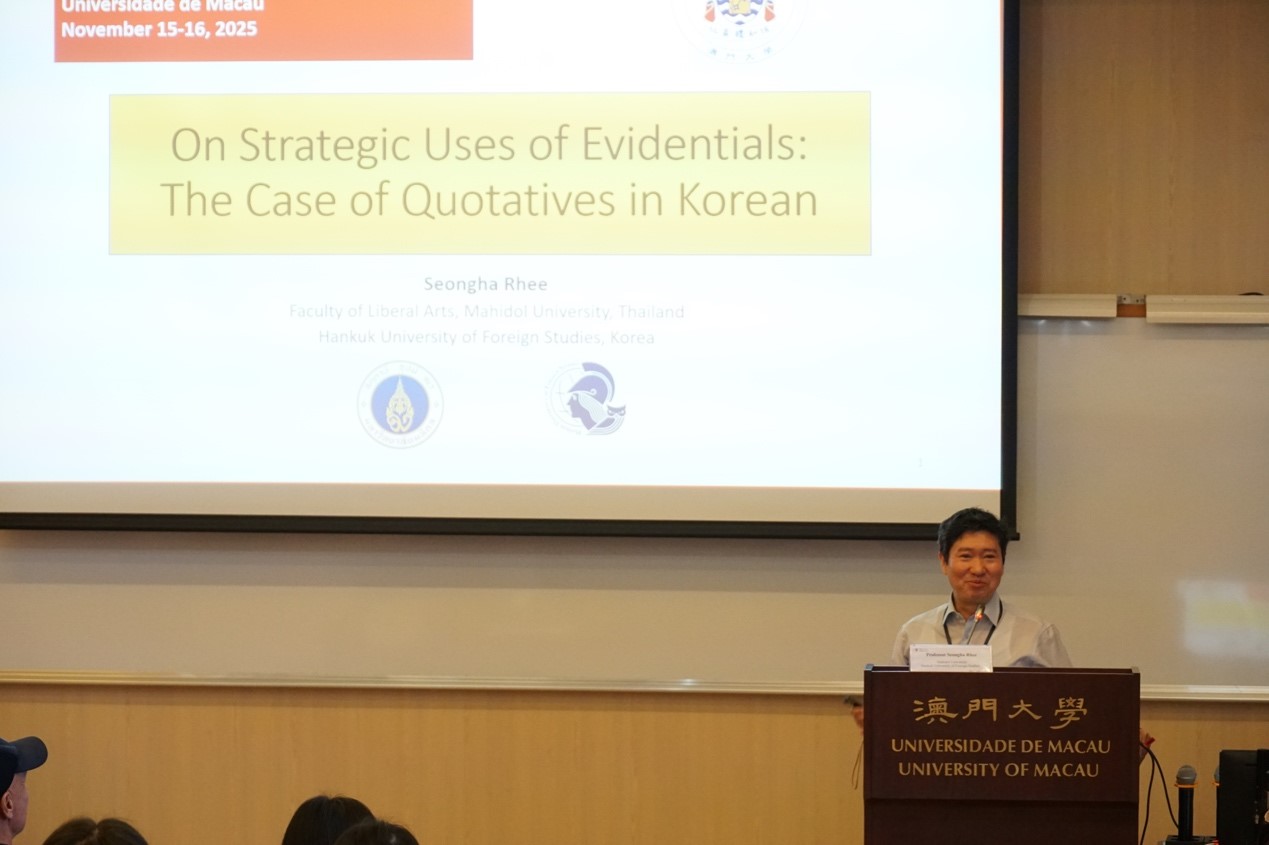The 3rd Conference on Evidentiality and Its Related Categories was successfully held from 15 to 16 November, 2025 at the University of Macau (UM). The conference was organized by the Department of Japanese, and co-organized by the Centre for Linguistics, Faculty of Arts and Humanities, UM.

More than 30 scholars from around the world gathered to share and discuss their latest research findings. They are affiliated with over 20 prestigious universities, including (in order of presentation) Central Queensland University, Mahidol University, Hankuk University of Foreign Studies, Tohoku University, The University of Tokyo, University of Toyama, The Hong Kong polytechnic University, Peking University, Hiroshima University, Kyushu Institute of Technology, Institute of Science Tokyo, Nara University, Beijing Normal University, University of Helsinki, Seoul National University, The University of Hong Kong, Chulalongkorn University, Nankai University, National University of Singapore, The University of Osaka, Sun Yat-sen University, Lanzhou University, Johannes Gutenberg University Mainz (University of Mainz), Fudan University, Xinjiang University, University of Macau, Jiangsu University of Technology, and Southwest Jiaotong University.
The conference commenced with a welcoming speech by Professor Jie Xu, Dean of the Faculty of Arts and Humanities and Director of the Centre for Linguistics, UM. Dean Xu introduced the UM, the Faculty of Arts and Humanities, and the linguistics discipline at the UM, extending a warm welcome to experts and scholars from home and abroad who gathered at the university for academic exchange. Subsequently, Professor Wenjiang Yang, Head of the Department of Japanese at the UM, provided an overview of the history of the evidentiality conference series and the details of this year’s conference.


The morning of 15 November featured three plenary talks. The first was an online talk by Professor Alexandra Y. Aikhenvald from Central Queensland University, which was moderated by Professor Chia-Jung Pan from Beijing Normal University. Professor Aikhenvald discussed how evidentiality, as a grammatical category, reflects social practices and ways of acquiring knowledge. She emphasized the important role of evidentiality in language ecology and social change, noting how it has evolved with the advent of social media and new sources of information.

The second plenary talk was delivered by Professor Seongha Rhee from Mahidol University and Hankuk University of Foreign Studies and moderated by Professor Wenjiang Yang. Professor Rhee presented on the strategic use of quotative evidentials in Korean and highlighted how these grammatical forms evolved from quotation structures into various grammatical markers, playing a significant role in discourse rhetoric. He pointed out how the strategic use of these quotatives led to innovations and grammaticalization in both vocabulary and grammar.

The third keynote speaker, Professor Heiko Narrog from Tohoku University, explored the definition of evidentiality as a linguistic category and provided an overview of evidentiality in Japanese. He also discussed the boundaries and controversies between evidentiality and related grammatical categories such as modality. This talk was moderated by Professor Mingyuan Shao from Sun Yat-sen University.

From the afternoon of the 15th to the afternoon of the 16th, scholars delivered a total of 22 session talks. The target languages primarily focused on Asian languages, including Chinese (Mandarin, Cantonese, Xiaoshan dialect, Yunnan Mandarin dialects), Japanese (Standard Japanese, Fukuoka dialect, Kochi dialect), Korean, Thai, Amdo Tibetan, Zbu Rgyalrong, nDraba, Kangjia, Kazakh, Tsou, Wutun, and Macau Creole Portuguese. The scope also extended to European and African languages, such as French and other Romance languages, Bulgarian, Bantu languages and other Central African languages.
In addition to describing and analyzing the phonological, morphological, syntactic, semantic, and pragmatic features of evidential markers in these languages and dialects, the presentation topics also included explorations of the relationships between evidentiality and other linguistic categories such as epistemic modality, mirativity, egophoricity, quotative constructions, tense, and aspect. Further topics covered typological and cross-linguistic comparative studies of evidentiality, language contact, and historical evolution.

The closing ceremony on the afternoon of 16 November was chaired by Professor Wenjiang Yang. Professor Seongha Rhee and Professor Heiko Narrog delivered closing remarks. Professor Chia-Jung Pan introduced the publication plans for the conference proceedings, and finally, Professor Yang Huang announced that the next conference will be held in 2027 at Southwest Jiaotong University, China.

The Conference on Evidentiality and Its Related Categories is the principal academic forum in China for the study of evidentiality. It was initiated by Professor Chia-Jung Pan (Beijing Normal University), Professor Wenjiang Yang (University of Macau) and Professor Mingyuan Shao (Sun Yat-sen University), and up to now has been held three times, with the previous two conferences held in 2018 at Sun Yat-sen University, China and in 2023 at Beijing Normal University, China. The first two conferences used Chinese as the working language, involved participants from China, and primarily focused on languages within China. In contrast, this year’s conference adopted English as the working language, with participating scholars and research languages expanding to include other countries around the world.

